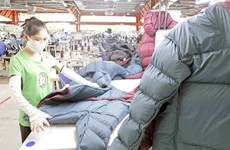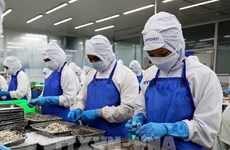Competitiveness of Vietnam farm produce falling fast
The competitiveness of Vietnamese agricultural and aquatic products is
weakening compared to that of foreign counterparts in the global market,
leading to a dramatic fall in these commodities’ exports so far.
The competitiveness of Vietnamese agricultural and aquatic products is
weakening compared to that of foreign counterparts in the global market,
leading to a dramatic fall in these commodities’ exports so far.
Agriculture contributed just 0.28 percent to the gross domestic product growth rate in the first quarter of 2015, the slowest pace since 2011, heard a June 6 workshop held by the Institute of Policy and Strategy for Agriculture and Rural Development under the Ministry of Agriculture and Rural Development.
Institute Director Nguyen Do Anh Tuan said the shipment decrease is not being rectified, and noted that the dropping demand has been compounded by the emergence of strong rivals that have left local products struggling to compete.
He pointed out that other countries float foreign exchange rates, unlike Vietnam which keeps the rate fixed. This makes foreign products cheaper, as is clearly seen with coffee, shrimp and tra fish.
In terms of rice, Cambodian and Myanmar rice now are deemed high quality and can easily outstrip Vietnamese rice in the major trade partner China.
Coffee is another currency earner for Vietnam, yet Colombia has succeeded in a re-cultivating programme making its coffee more competitive than the Vietnamese product in both price and quality, he stressed, noting that Brazil has also cut down prices to reduce inventory.
Vietnamese tra fish now has to compete with white-fleshed fish, which is strongly developed in other countries, while more shrimp products from India, Thailand, Indonesia and Mexico are hitting supermarket shelves in the US.
Local fruits that are traditionally prominent in China, like lychees, plums, dragon fruit and water melons are also encountering challenges, as the northern neighbour is rapidly growing fruit trees itself, enabling it to export its fruits to Vietnam, Tuan added.
Workshop attendees also underlined the poor quality of made-in-Vietnam farm produce and misguided strategies that mean they can no longer meet global demand. For example, Vietnam has mostly shipped abroad Robusta coffee while foreign markets prefer Arabica.
They also pointed out a lack of market information, especially relating to China, further undermining Vietnamese edge in this critical market.
It will be hard for Vietnam to supply goods with lower prices and higher quality so as to outpace other countries’ commodities unless it makes scientific and technological breakthroughs in agriculture, Tuan said.
Director of the Centre for Agricultural Policy Consultation, Dang Kim Khoi, said it is necessary to promote the production of quality goods, adding that Vietnam should step up coffee tree re-cultivation and the planting of first-rate rice varieties, curb the expansion of rubber tree areas, and control the supply of tra fish. He also asked for the development of the support industry and processing technology.
Other experts suggested the country provide aid to exporters to counter the impact of the exchange rate. The aid can be in the form of reducing value added tax and enterprise income tax, widening credit limits, and assisting in transport expenses and trade promotion.-VNA
Agriculture contributed just 0.28 percent to the gross domestic product growth rate in the first quarter of 2015, the slowest pace since 2011, heard a June 6 workshop held by the Institute of Policy and Strategy for Agriculture and Rural Development under the Ministry of Agriculture and Rural Development.
Institute Director Nguyen Do Anh Tuan said the shipment decrease is not being rectified, and noted that the dropping demand has been compounded by the emergence of strong rivals that have left local products struggling to compete.
He pointed out that other countries float foreign exchange rates, unlike Vietnam which keeps the rate fixed. This makes foreign products cheaper, as is clearly seen with coffee, shrimp and tra fish.
In terms of rice, Cambodian and Myanmar rice now are deemed high quality and can easily outstrip Vietnamese rice in the major trade partner China.
Coffee is another currency earner for Vietnam, yet Colombia has succeeded in a re-cultivating programme making its coffee more competitive than the Vietnamese product in both price and quality, he stressed, noting that Brazil has also cut down prices to reduce inventory.
Vietnamese tra fish now has to compete with white-fleshed fish, which is strongly developed in other countries, while more shrimp products from India, Thailand, Indonesia and Mexico are hitting supermarket shelves in the US.
Local fruits that are traditionally prominent in China, like lychees, plums, dragon fruit and water melons are also encountering challenges, as the northern neighbour is rapidly growing fruit trees itself, enabling it to export its fruits to Vietnam, Tuan added.
Workshop attendees also underlined the poor quality of made-in-Vietnam farm produce and misguided strategies that mean they can no longer meet global demand. For example, Vietnam has mostly shipped abroad Robusta coffee while foreign markets prefer Arabica.
They also pointed out a lack of market information, especially relating to China, further undermining Vietnamese edge in this critical market.
It will be hard for Vietnam to supply goods with lower prices and higher quality so as to outpace other countries’ commodities unless it makes scientific and technological breakthroughs in agriculture, Tuan said.
Director of the Centre for Agricultural Policy Consultation, Dang Kim Khoi, said it is necessary to promote the production of quality goods, adding that Vietnam should step up coffee tree re-cultivation and the planting of first-rate rice varieties, curb the expansion of rubber tree areas, and control the supply of tra fish. He also asked for the development of the support industry and processing technology.
Other experts suggested the country provide aid to exporters to counter the impact of the exchange rate. The aid can be in the form of reducing value added tax and enterprise income tax, widening credit limits, and assisting in transport expenses and trade promotion.-VNA













